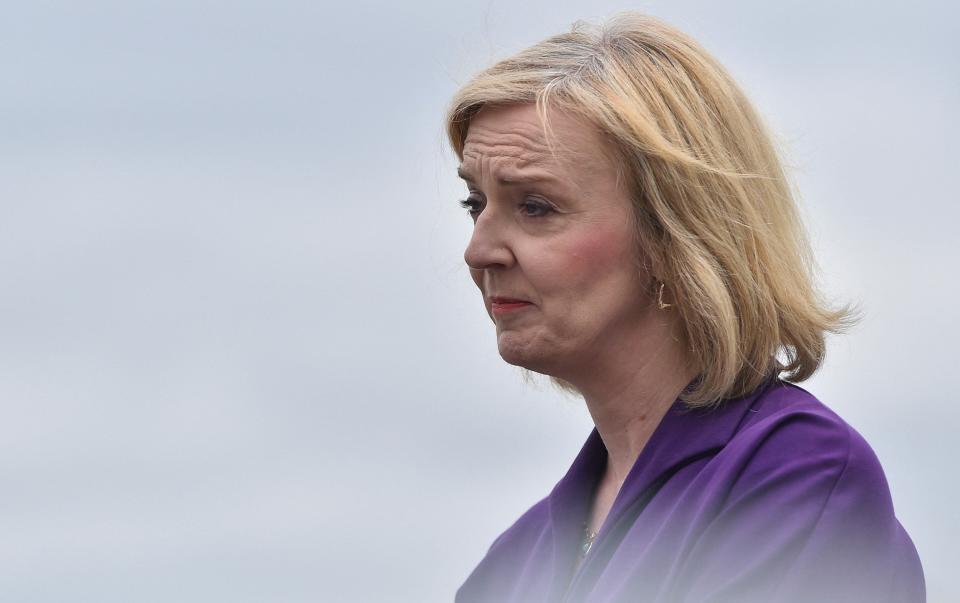Inflation surge threatens Truss's tax cut plans, says IFS

Soaring inflation and rising interest rates will send the Government’s benefits, pensions and borrowing bills through the roof next year, throwing Liz Truss’s tax cut plans into doubt.
Borrowing will be £39bn higher than previously expected over the next two years, the Institute for Fiscal Studies has warned, limiting room for significant tax and spend giveaways. It comes as surging inflation pushes Government spending higher than forecast.
“The two candidates for Prime Minister need to recognise this even greater-than-usual uncertainty in the public finances,” the IFS said.
“Additional borrowing in the short term is not necessarily problematic – and indeed may be appropriate to fund targeted support. But significant permanent tax cuts would, unless matching spending cuts can be delivered, certainly increase the chances that the government fails to meet its own manifesto commitments on borrowing.”
Inflation adds to the Government’s costs as the state pension rises annually by the highest of September’s consumer price inflation, average wages or 2.5pc under the triple lock. It means payments are expected to go up sharply next year, with inflation at 10.1pc in July and set to rise further.
The state pension will breach the £200 a week mark for the first time next April, with pensioners on track for a record boost as a result of runaway inflation.
Benefits are also linked to prices, while interest payments on around one-quarter of the national debt are linked to the retail price index measure of inflation.
Inflation also boosts tax revenues, with higher prices bringing in more VAT revenue and rising wages resulting in more income tax payments. That negates some of the hit further out into the 2020s, but the risks are significant.
Carl Emmerson at the IFS said: “The reality is that the UK has got poorer over the last year. That makes tax and spending decisions all the more difficult.
“It is hard to square the promises that both Ms Truss and Mr Sunak are making to cut taxes over the medium-term with the absence of any specific measures to cut public spending and a presumed desire to manage the nation’s finances responsibly.”
Ms Truss’s pledges include a promise to reverse April’s national insurance tax increase and cancel next year’s rise in corporation tax.
Rishi Sunak has offered to cut VAT on energy bills and a series of reductions in the basic rate of income tax.
“Only last month the OBR warned that the public finances are already on an unsustainable long-term path: large, unfunded, permanent tax cuts would only act to make this problem worse,” the IFS said.
Fitch, the credit ratings agency, said “weaker growth and higher inflation will further constrain fiscal room for manoeuvre”, leaving the finances vulnerable to even a small further deterioration in economic conditions.
“Moreover, tax cuts and support packages beyond those announced for households could exacerbate inflationary pressures and feed into second-round effects, for example, by causing inflation expectations to deteriorate, forcing the Bank of England to increase rates even further,” the agency said.
A Truss campaign source said that “as Prime Minister, Liz would use an emergency budget to kickstart her plan to get our economy growing and put more money into the pockets of hardworking people.”
“Liz will cut taxes using the existing fiscal headroom and will get debt to GDP falling within three years. You cannot tax your way to growth, and business as usual will not do,” the source said.
“We need a new approach to the economy, we need to challenge the failing economic orthodoxy and we need to deliver the necessary reform to tackle inflation and achieve sustainable growth.”
Mr Sunak’s spokesman said the IFS report “drives a coach and horses through Liz's economic plan. Rishi has consistently made the case that permanent, unfunded tax cuts would cause significant damage to the public finances and push inflation up higher.”

 Yahoo Movies
Yahoo Movies 